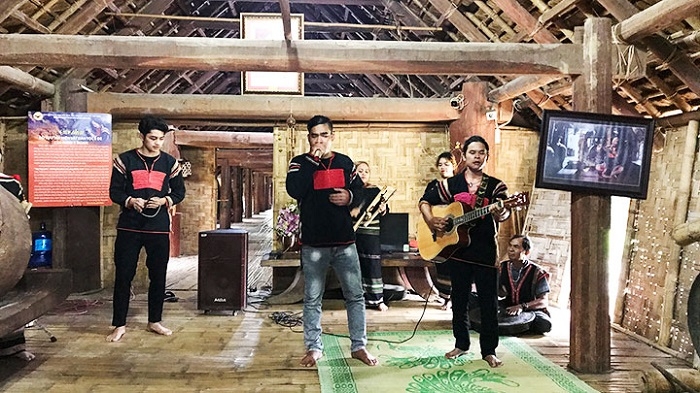After half a summer of "freezing" due to the pandemic, tourism sector in the capital city is gradually resuming its services. In addition to observing strict requirements of COVID-19 prevention, it is also necessary for the city’s hospitality sector to be refreshed towards serving visitors.

E De ethnic people perform at the Vietnam National Village for Ethnic Culture and Tourism.
The pandemic has seen complicated developments in many places in the city, causing people to avoid or reduce travel and reducing the need to travel in general. The Hanoi Old Quarter as well as tourist sites were left deserted. Many offices of travel agents, tour organisers, hotels and souvenir shops have closed. In the suburbs of Hanoi, many eco-tourism areas and resorts experienced similar situations.
These days, the city’s hospitality sector has prepared for the launch of a tourist season. Many tourist attractions in the suburban areas of Hanoi have welcomed back visitors. Vietnam National Village for Ethnic Culture and Tourism in the Dong Mo Tourism Area of Son Tay District is currently hosting a month-long rural market which recreating the idyllic atmosphere in the rural markets of Vietnamese ethnic groups.
The city's tourism sector has directed travel businesses to work out new tourist products in the new context, focusing on encouraging Hanoians to travel Hanoi. This cautious direction was made as several of Hanoi’s neighbouring provinces continue to record new cases of COVID-19 infection or have just passed the peak of the pandemic.
Strictly following pandemic prevention and control measures is the top priority to ensure safe tourism. It is also crucial to review the limitations and inadequacies in tourism activities in Hanoi in recent times in order to make timely adjustments.
Amid the challenges of COVID-19, tourist activities should turn to nature-based tourism and ecological tourism, which not only invite tourists to enjoy outdoor spaces and picnic activities but also limit gatherings in small spaces. In the long term, clean environment, green spaces, and natural conditions will become more important criteria for sustainable tourism in the cycle of urbanisation and industrialisation.
According to Pham Thanh Quyen, an expert on cultural heritage in Besancon City, France, a large number of people in many European countries are now in favour of nature-based tourism activities after the long period of having to stay at home due to COVID-19.
Quyen suggested that outdoor tourist events should also include outdoor performances, concerts and other entertainment activities. She also recommended that managers at tourist sites should limit the number of tourists at the same time to ensure anti-pandemic prevention and improve the quality of the time tourists spend at the site, particularly in the blazing hot summer.
Meanwhile, musician Nguyen Quang Long, a member of the Ha Thanh Xam Group who has hosted many performances at pedestrian areas around Hoan Kiem Lake, what makes Hanoi stand out from other localities is its unique traditional culture as the city is home to assorted tangible and intangible cultural heritages. Therefore, he recommends to develop tourism with a stronger integration with culture.